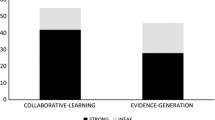Abstract
Participatory modeling is increasingly recognized as an effective way to assist collective decision-making processes in the domain of natural resource management. This article introduces a framework for evaluating projects that have adopted a participatory modeling approach. This evaluation framework—known as the “Protocol of Canberra”—was developed through a collaboration between French and Australian researchers engaged in participatory modeling and evaluation research. The framework seeks to assess the extent to which different participatory modeling initiatives not only modify perceptions among and interactions between participants, but also contribute to collective decision-making. The article discusses the development of the framework and it’s application to three case-studies, two from Australia and one from the Pacific Island of the Republic of Kiribati. The article concludes with some comments for future use of the framework in a range of participatory modeling contexts.


Similar content being viewed by others
References
ANR (2005) Programme Federateur “Agriculture et Developpement Durable”:13-14. Online [URL]: http://www.agence-nationale-recherche.fr/documents/aap/resultatADD05.pdf
Argyris C (1999) On organizational learning. Wiley-Blackwell, Oxford, UK, 464 pp
Barreteau O, Le Page C, Perez P (2007) Contribution of simulation and gaming to natural resource management issues: an introduction. Simulation and Gaming 38(2):185
Beuret JE (2006) La Conduite de la Concertation pour la Gestion de l’Environnement et le Partage des Ressources. Editions L’Harmattan, Paris, 342 pp
Blackstock KL, Kelly GJ, Horsey BL (2007) Developing and applying a framework to evaluate participatory research for sustainability. Ecological Economics 60(4):726–742
Bousquet F, Barreteau O, D’Aquino P, Etienne M, Boissau S, Aubert S, Le page C, Babin D, Castella J-C (2002) Multi-agent systems and role games: collective learning processes for ecosystem management. In: Janssen MA (ed) Complexity and ecosystem management: the theory and practice of mulit-agent systems. Edward Elgar Publishers, pp 248–285
Brown V, Pitcher J (2005) Linking community and government: islands and beaches. In: Keen M, Brown V, Dyball R (eds) Social learning in environmental management: towards a sustainable future. James & James/Earthscan, London, pp 123–145
Checkland P (1981) Systems thinking, systems practice. Wiley, Chichester, UK
Colella V (2000) Participatory simulations: building collaborative understanding through immersive dynamic modeling. Journal of the Learning Sciences 9(4):471–500
ComMod Group (2003) Our companion modelling. Journal of Artificial Societies & Social Simulation 6(1). http://jasss,soc.surrey.ac.uk/6/2/1.html
Curnan S, LaCava L, Sharpstee D, Lelle M, Reece M (1998) W.K Kellogg Foundation evaluation handbook. Online [URL]: http://www.wkkf.org/pubs/Tools/Evaluation/Pub770.pdf
Daniell KA (2007) Summary report: stakeholder workshops 2 & 3 for the lower hawkesbury estuary management plan. LHEMP project report prepared for the Hornsby Shire Council and BMT WBM, Fenner School, Australian National University, p 76
Daniell KA, Ferrand N (2006) Participatory modelling for water resources management and planning, D3.8.2, Aquastress IP, FP6, Europe
Dray A, Perez P, Jones N, Le Page C, D’Aquino P, White I, Auatabu T (2006) The AtollGame experience: from knowledge engineering to a computer-assisted role playing game. Journal of Artificial Societies and Social Simulation 9(1). Online [URL]: http://jasss.soc.surrey.ac.uk/9/1/6.html
Dray A, Perez P, Le Page C, D’Aquino P, White I (2007) Who wants to terminate the game? The role of vested interests and metaplayers in the ATOLLGAME experience. Simulation and Gaming, May 2007
Goddard R (2005) Central coast regional futures planning project: a research partnership to help the communities and governments of the central coast (NSW) develop a capacity for evidence-based Strategic Planning Final Report. CSIRO Sustainable Ecosystems, Canberra
Hare M, Letcher RA, Jakeman AJ (2003) Participatory modelling in natural resource management: a comparison of four case studies, vol 4(2). Taylor & Francis, pp 62–72
Hisschemoller R, Tol RSJ, Vellinga P (2001) The relevance of participatory approaches in integrated environmental assessment. Integrated Assessment 2:57–72
Hutchins E (1995) Cognition in the Wild (ISBN 0-262-58146-9). MIT Press
Kelly G, Walker P (2004) Community-level systems thinking. In: 2nd international conference of the system dynamics society, Oxford
Lynam T, de Jong W, Sheil W, Kusumanto T, Evans K (2007) A review of tools for incorporating community knowledge, preferances and values into decision making in natural resource management. Ecology and Society 12(1). Online [URL]: http://www.ecologyandsociety.org/vol12/iss1/art5/
Maurel P, Flavie C, Ferrand N, Marc C, Valkering P (2004) Some methodological concepts to analyse the role of IC-tools in social learning processes. HarmoniCOP Work Package 3. International Environmental Modeling and Software Society (iEMSs). Online [URL]: http://citeseer.ist.psu.edu/maurel04some.html
Mermet L, Billé R, Leroy M, Narcy J-B, Poux X (2005) L’analyse stratégique de la gestion environnementale: un cadre théorique pour penser l’efficacité en matière d’environnement. Natures Sciences Sociétés 13:127–137
Midgley G (2000) Systemic intervention: philosophy, methodology and practice. Kluwer Academic, New York, USA, 468 pp
Mostert E, Pahl-Wostl C, Rees Y, Searle B, Tabara D, Tippett J (2007) Social learning in European river-basin management: barriers and fosterin mechanisms from 10 river basin. Ecology and Society 12(1):19
Pahl-Wostl C (2002) Participative and stakeholder-based policy design, evaluation and modeling processes. Integrated Assessment 3(1):3–14
Patton MQ (1992) Qualitative evaluation and research methods, 3rd edn. Sage Publications, Newbury Park, California
Reeson AF, Tisdell JG (2008) Institutions, motivations and public goods: An experimental test of motivational crowding. Journal of Economic Behavior & Organization, 68(1):273–281
Rouwette EAJA, Vennix J, van Mullekom T (2002) Group model building effectiveness: a review of assessment studies. System Dynamics Review 18(1):5–45
Siebenhuner V, Barth V (2005) The role of computer modeling in participatory integrated assessments. Environmental Impact Assessment Review 25:367–389
Standards Australia (2006). Environmental risk management—principles and processes. Standards Australia, HB 203:2006, Sydney, Australia
Van den Belt M (2004) Mediated modeling: a systems dynamics approach to environmental consensus building. Washington, Island Press
Webler T (1999) The craft and theory of public participation: a dialectical process. Journal of Risk Research 2(1):55–71
World Bank Operations Evaluation Department (2004) Monitoring and evaluation: some tools, methods and approaches. The World Bank, Washington, DC. Online [URL]: http://www.agence-nationale-recherche.fr/documents/aap/resultatADD05.pdf
Zuber-Skerritt O (1992) Professional development in higher education: a theoretical framework for action research. Kogan Page, London
Acknowledgments
This research was supported by CIRAD (France) and CSIRO-CSS (Australia). The evaluation framework and case studies are part of an international project called ADD-ComMod, led by INRA (France) and funded by the Agence Nationale de Recherche (France). Thanks to Russell Goddard for facilitating the Catalyst study evaluation, Pieter Bots for assistance with Fig. 1, and Rachel Williams and Kostas Alexandridis for helpful comments on the draft manuscript. Thank you especially to the participants and project teams of the case studies, who gave their time to complete the evaluation procedures.
Author information
Authors and Affiliations
Corresponding author
Rights and permissions
About this article
Cite this article
Jones, N.A., Perez, P., Measham, T.G. et al. Evaluating Participatory Modeling: Developing a Framework for Cross-Case Analysis. Environmental Management 44, 1180–1195 (2009). https://doi.org/10.1007/s00267-009-9391-8
Received:
Accepted:
Published:
Issue Date:
DOI: https://doi.org/10.1007/s00267-009-9391-8




